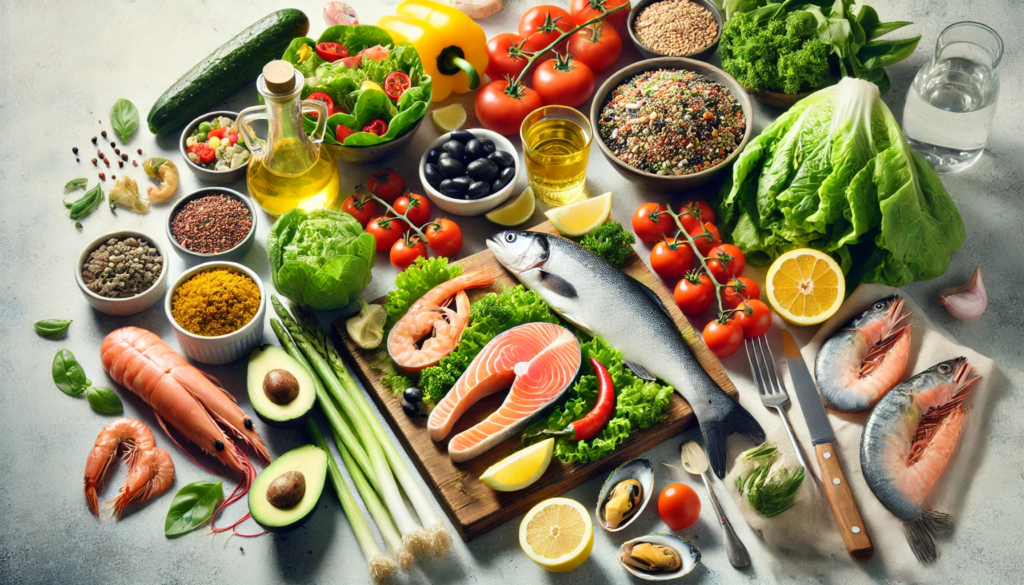The pescatarian diet is a dietary lifestyle that combines elements of vegetarianism with the inclusion of seafood. This diet focuses on plant-based foods while allowing for the consumption of fish and other seafood. It offers a flexible approach to eating that can provide a range of nutritional benefits. In this article, we’ll explore what the pescatarian diet entails, its key characteristics, origins, history, and how it compares to other popular diets like Mediterranean, vegetarian, and vegan.
What is a Pescatarian Diet?
A pescatarian diet is a primarily plant-based diet that includes fish and other seafood as the main sources of animal protein. The term “pescatarian” is derived from the Italian word “pesce,” meaning fish, combined with “vegetarian.” This diet excludes the consumption of other types of meat, such as poultry, pork, and beef, while incorporating a variety of plant-based foods such as fruits, vegetables, legumes, nuts, seeds, whole grains, and dairy products (optional).
Key Characteristics of a Pescatarian Diet
- Inclusion of Seafood: The defining feature of the pescatarian diet is the inclusion of fish and seafood. This provides a rich source of protein, omega-3 fatty acids, and other essential nutrients.
- Plant-Based Focus: While seafood is included, the diet emphasizes a variety of plant-based foods, offering a wide range of vitamins, minerals, fiber, and antioxidants.
- Exclusion of Land Animal Meats: The diet does not include meat from land animals such as poultry, pork, beef, and other red meats.
- Flexibility with Dairy and Eggs: Pescatarians may choose to include or exclude dairy products and eggs, depending on personal preferences and dietary goals.
- Health-Conscious Choices: Many who follow the pescatarian diet focus on sustainable and environmentally friendly seafood options, as well as organic and minimally processed plant-based foods.
Origin and History of the Pescatarian Diet
The pescatarian diet has been practiced for centuries, often as a way to adhere to cultural, religious, or ethical dietary restrictions. In many coastal regions, fish has been a staple in the diet due to its availability and nutritional benefits. Historical records show that various cultures around the world, including the Mediterranean, Asian, and Scandinavian populations, have traditionally consumed diets rich in fish and seafood.
The modern concept of pescatarianism gained popularity as people became more health-conscious and environmentally aware. The diet is often seen as a middle ground between a vegetarian diet and a diet that includes all types of animal meat, offering the benefits of plant-based eating while still providing high-quality animal protein from seafood.
Difference Between Pescatarian and Other Diets
Pescatarian vs. Vegetarian
- Pescatarian: Includes fish and seafood, along with plant-based foods. May include dairy and eggs.
- Vegetarian: Excludes all meat and seafood but may include dairy and eggs (lacto-ovo vegetarian), only dairy (lacto-vegetarian), or only eggs (ovo-vegetarian).
Pescatarian vs. Vegan
- Pescatarian: Includes fish and seafood, with an emphasis on plant-based foods. May include dairy and eggs.
- Vegan: Excludes all animal products, including meat, seafood, dairy, eggs, and honey. Focuses entirely on plant-based foods.
Pescatarian vs. Mediterranean Diet
- Pescatarian: Primarily plant-based with seafood as the main source of animal protein. May include dairy and eggs.
- Mediterranean Diet: Includes a variety of foods, emphasizing fruits, vegetables, whole grains, legumes, nuts, olive oil, and moderate consumption of fish and seafood. It also includes moderate amounts of dairy, poultry, and eggs, with minimal red meat intake.
Pescatarian vs. Flexitarian Diet
- Pescatarian: Consistently includes seafood and plant-based foods, with no other meat consumption.
- Flexitarian: Primarily plant-based but occasionally includes all types of meat, including poultry, pork, and beef, in moderation.
Conclusion
The pescatarian diet offers a balanced approach to eating, combining the health benefits of a plant-based diet with the nutritional advantages of seafood. It provides a flexible and sustainable way to meet dietary needs while potentially lowering the risk of chronic diseases. Understanding the key characteristics, origins, and differences between the pescatarian diet and other diets can help individuals make informed choices about their dietary preferences and overall health. Whether for health reasons, environmental concerns, or personal ethics, the pescatarian diet is a viable and nutritious option for many.
FAQs
Is a pescatarian diet healthier than a vegetarian diet?
A pescatarian diet can be as healthy as a vegetarian diet, depending on food choices. Including fish provides additional sources of omega-3 fatty acids, which are beneficial for heart health. However, both diets can be healthy if they include a variety of nutrient-dense foods.
Can pescatarians eat dairy and eggs?
Yes, pescatarians may choose to include dairy and eggs in their diet, similar to lacto-ovo vegetarians. The diet’s flexibility allows individuals to tailor their food choices based on personal preferences and nutritional needs.
What are some good protein sources in a pescatarian diet?
Good protein sources in a pescatarian diet include fish (such as salmon, tuna, and mackerel), shellfish (such as shrimp, mussels, and crab), eggs, dairy products (if included), tofu, legumes, nuts, seeds, and whole grains like quinoa.
How often should seafood be consumed on a pescatarian diet?
The frequency of seafood consumption on a pescatarian diet can vary. However, it’s generally recommended to include fish or seafood 2-3 times per week to benefit from omega-3 fatty acids and other nutrients.
Can a pescatarian diet help with weight loss?
A pescatarian diet can support weight loss if it includes nutrient-dense, low-calorie foods and is paired with regular physical activity. Fish and seafood are typically lower in calories and high in protein, which can promote satiety.
Are there any environmental concerns with a pescatarian diet?
Overfishing and unsustainable fishing practices can have negative environmental impacts. Pescatarians are encouraged to choose sustainably sourced seafood to minimize their ecological footprint. Look for labels like MSC (Marine Stewardship Council) or ASC (Aquaculture Stewardship Council) to ensure responsible seafood choices.



